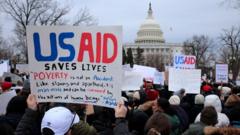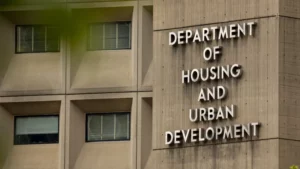As the Trump administration looks to cut government spending, USAID's staffing levels could plummet from around 10,000 personnel to a mere 294 essential employees, sparking legal challenges and protests over the implications for global humanitarian efforts.
Major Cuts at USAID: Staff Reduction Could Plunge from 10,000 to 294

Major Cuts at USAID: Staff Reduction Could Plunge from 10,000 to 294
The Trump administration's proposed budget cuts are set to drastically reduce USAID's workforce, impacting global aid delivery and provoking widespread criticism.
In a significant move that threatens to transform America’s foreign aid landscape, the Trump administration has announced plans to drastically reduce staff at the United States Agency for International Development (USAID). The agency, which currently employs approximately 10,000 personnel worldwide, is projected to see its workforce shrink to fewer than 300 essential team members. This situation has emerged due to major budget cuts and efforts to align foreign aid with the “America First” policy.
As of midnight on Friday, the bulk of USAID employees, including thousands stationed abroad, will reportedly be placed on administrative leave, according to an internal agency communication. Only a small group, described as “essential,” is expected to continue operations. This proposed transformation has already frozen hundreds of aid programs across various global locations, causing a ripple effect in humanitarian assistance.
The push for these cuts has garnered staunch support from figures like Elon Musk, who has criticized USAID for alleged inefficiencies and waste in taxpayer spending. Polling data indicates that a significant portion of the American electorate is skeptical about foreign aid; a recent AP-NORC poll found that around 90% of Republican respondents believe the U.S. is overextending its financial commitments abroad.
Former USAID chief Brian Atwood condemned the proposed cuts as “outrageous,” arguing that such drastic measures could fatally undermine an agency that has historically saved millions of lives. In response, the American Foreign Service Association, along with the American Federation of Government Employees, has filed a lawsuit challenging the legality of the cuts, asserting that dismantling USAID without Congressional approval violates constitutional and federal laws.
The lawsuit specifically names Trump, the state department, and other top officials as defendants, calling for the appointment of an independent director for the agency, restoration of functioning USAID resources, and the resumption of crucial aid initiatives. The legality of the administration's fiscal strategy is under scrutiny, with claims that it has exacerbated a global humanitarian crisis and jeopardized U.S. national security interests.
For their part, defenders of the cuts, including prominent officials like Marco Rubio, maintain that the U.S. is not withdrawing from foreign aid altogether; rather, they insist it must be oriented towards U.S. interests and priorities for it to continue. Rubio assured workers in Guatemala that the distribution of aid remains a priority but will require justifiable program alignment with national needs.
As the Friday deadline looms, thousands of USAID staff brace for administrative leave, casting uncertainty on the future of American humanitarian efforts worldwide.






















